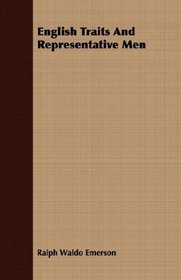Search -
English Traits And Representative Men
English Traits And Representative Men
Author:
ENGLISH TRAITS AND REPRESENTATIVE MEN BY RALPH WALDO EMERSON. CONTENTS. ENGLISH TRAITS. THAI, PAGE , KIUST VISIT TO ENGLAND l IK VOYAIIK TO IteuND , , 19 III, LAND . 27 IV RACK ... 36 V. ABILITY 60 VL MANNKKN 83. VII. TuiTit , , 94 VIII. InAUAHKU . 103 IX, ilKAYNK . 117 X. WKMTII , 125 XI, AinswuAcv 140 XU, UNIVKUSITIK. S , 161 Xill HKMCION . 17... more »
Author:
ENGLISH TRAITS AND REPRESENTATIVE MEN BY RALPH WALDO EMERSON. CONTENTS. ENGLISH TRAITS. THAI, PAGE , KIUST VISIT TO ENGLAND l IK VOYAIIK TO IteuND , , 19 III, LAND . 27 IV RACK ... 36 V. ABILITY 60 VL MANNKKN 83. VII. TuiTit , , 94 VIII. InAUAHKU . 103 IX, ilKAYNK . 117 X. WKMTII , 125 XI, AinswuAcv 140 XU, UNIVKUSITIK. S , 161 Xill HKMCION . 17... more »
ISBN-13: 9781406702699
ISBN-10: 1406702692
Publication Date: 3/15/2007
Pages: 484
Rating: ?
ISBN-10: 1406702692
Publication Date: 3/15/2007
Pages: 484
Rating: ?
0 stars, based on 0 rating
Publisher: Giniger Press
Book Type: Paperback
Other Versions: Hardcover
Members Wishing: 0
Reviews: Amazon | Write a Review
Book Type: Paperback
Other Versions: Hardcover
Members Wishing: 0
Reviews: Amazon | Write a Review




